The Trump Supporters...Who Are Secretly Voting for Hillary
Meet the Evangelical Christian women resolved to go behind the backs of their families, friends, and pastors to break party lines.
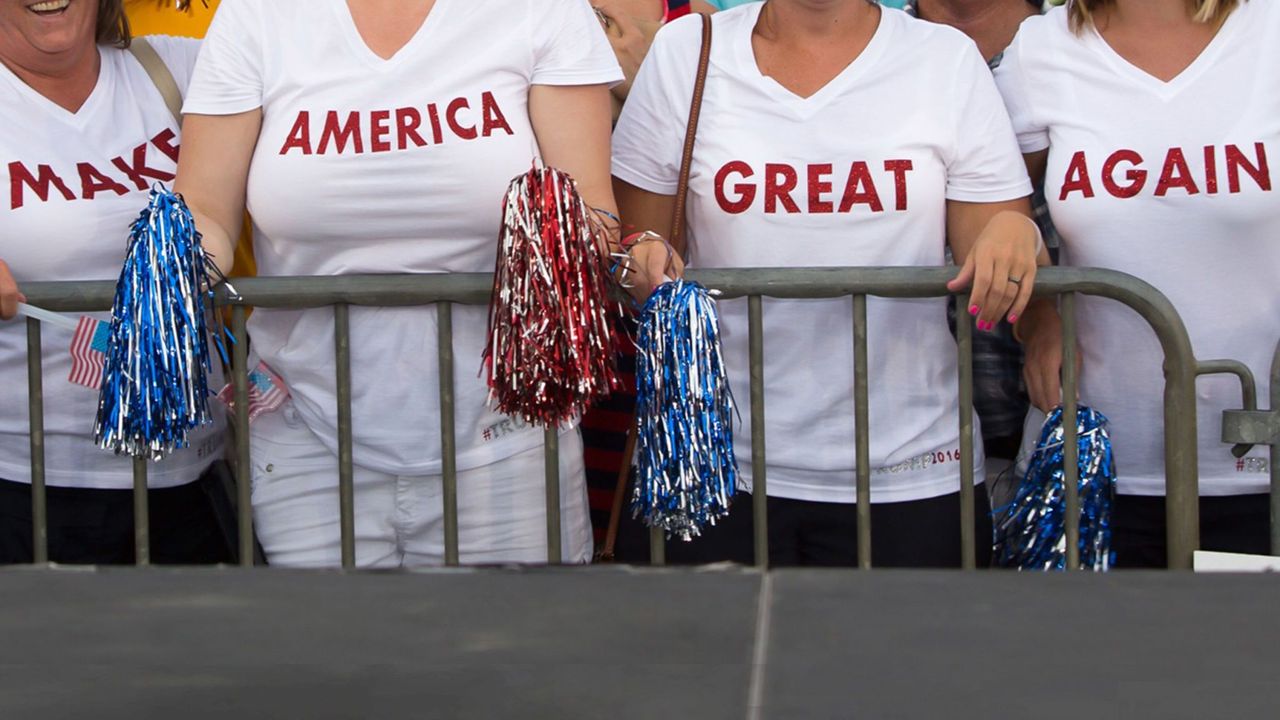
I live in Iowa, and in my church and at my children's parochial school, I'm an anomaly: "that crazy liberal." As a pro-choice, same-sex-rights advocating, Christian-identified feminist, I'm used to a fair amount of stares, passive-aggressive (or just downright aggressive) Facebook comments, and being asked to please not bring up politics at Bible study.
So when I went to caucus for Hillary Clinton back in February, I knew I wouldn't be joined by any friends—they were all across the street with my husband, throwing in with the Republican party. But as I made my way to the Clinton section, I saw the unmistakable wide smile of my neighbor Melody*, a Christian mother I have always assumed votes Republican. Melody is the former director of a local Christian non-profit—a revered religious leader in our town. And the last person I expected to see out here supporting Hillary.
I was stunned. "This is our little secret," she said as she gave me a warm hug. We laughed nervously.
Hillary is not who you would see as a typical Evangelical woman leader.
Over the course of the 2016 presidential election, I've come to find that Melody is not the only conservative woman in my community who's secretly voting Democrat. While nodding along with their husbands' politics and passing as Trump supporters in their neighborhoods, there's a group of women making fervent plans for what happens when they're finally alone in the voting booth.
As a swing state, Iowa has oscillated between red and blue for the past several decades. On the one hand, Iowa has some of Washington D.C.'s most conservative representatives. On the other, Iowa has a deeply progressive history. (In 1851, it became the second state in the nation to legalize interracial marriage; in 2009, it became the third state to legalize same-sex marriage.)
And yet, it's full of just the kind of people who support Donald Trump: white Christians, who, according to a 2015 PRRI survey, comprise 67 percent of the state's population, and senior citizens, of whom Iowa has a larger percentage than the national average. That's why, in poll after poll conducted by the Des Moines Register, Donald Trump has maintained a lead over Clinton. Harry Enten, a political writer and analyst for FiveThirtyEight, told the Register that Trump's messaging about "crooked Hillary" has worked particularly well in Iowa: "It's very clear that Iowa voters have a big beef with Hillary Clinton—more so than voters nationally."
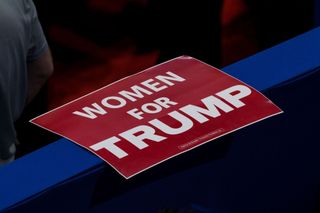
A sign at the 2016 Republican National Convention in Cleveland, Ohio
All of this weighs heavily on secret Hillary Clinton voter Jennifer*, a wife, mother, and Evangelical Christian in her 30s. "Hillary is not who you would see as a typical Evangelical woman leader," she admits, citing Clinton's pro-choice platform and unapologetic leadership in a male-dominated landscape as potential sticking points. That may explain why Clinton is spending time campaigning in Iowa in the final weeks before the election: to woo women just like her.
Stay In The Know
Get exclusive access to fashion and beauty trends, hot-off-the-press celebrity news, and more.
When I meet with Jennifer at our favorite local coffee shop, she immediately expresses concern that I'll "out" her. If Jennifer's presidential choice goes get beyond our café table, she says, it could cost her career: She works at a faith-based non-profit with a lot of Evangelicals, which makes it very hard for her to publicly support a Democratic candidate.
Most Evangelical Christians assume that others are like them. I don't correct their assumption.
As we talk, I look around the coffee shop and see my old boss, the pastor of the Lutheran church, and the photographer from the local paper. This is the kind of closeness that makes me feel claustrophobic—and makes political differences all the more fraught. We live and work with the people we vehemently disagree with—it's just a part of being in Iowa.
One woman who works in Jennifer's office shares homophobic and anti-Hillary Clinton memes on Facebook regularly—things that say Clinton should be in jail or that she's to blame for her husband's infidelity. "This isn't what Christians should be doing," Jennifer tells me—but she keeps her comments to herself online.
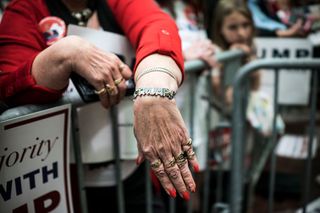
A woman shows off her Trump-branded bracelet at a campaign rally in Radford, Virginia
She's good at working within conservative religious spaces, and knows that she has to circumvent the issues carefully for professional advancement—and the advancement of her organization, which provides help to women in need. "For a long time the Republican Party has been viewed as the only acceptable choice," she says of her work environment.
This means she steers clear of voicing her beliefs both on social media and in person. "It's just not worth the capital for me to support Clinton in a visible context," she says. "But one on one, I try to convince people that there are other alternatives to Trump."
For the most part, though, she's content to "pass" as a Trump voter. "In a normal election cycle, most Evangelical Christians are assuming others are like them," she says. "I don't correct their assumption."
Susan*, another secret Hillary voter, is less cautious. In her 20s and a mother of two, she grew up in a conservative religious household and went to Bible college. In the past few years she's begun distancing herself from her conservative past—but still, she finds herself reticent to be vocal in her support of Clinton. "I just don't have the emotional energy to go there, especially with other Christians."
That doesn't mean other Iowans haven't gone there with her. Susan's husband is a vocal Clinton supporter, and as a result, she's been in many heated confrontations with friends who ask her how a Christian can support a pro-choice candidate. The emotional effort of constantly feeling like she's under attack—on Facebook, with her family, and with her clients—is taking its toll.
Evangelical wives are supposed to follow their husband's lead in every matter, including politics.
Susan suspects there are other women like her, but that part of the reason conservative female Christian voters won't openly support Clinton is because of the culture of submission in Evangelical churches. Wives are supposed to follow their husbands' lead in every matter, including politics. Speaking out against those traditional teachings can come with a risk—a social penalty of alienation from a very tight-knit community, to which spouses, extended family, children, and support systems are all intricately linked. Still, she knows of pockets of women who are defecting from Trump. "I hope all those people who are saying no to Trump are also, secretly, saying yes to Hillary," she says.
Susan and Jennifer are not as anomalous as we think. There are hundreds of private Facebook groups with names like "Secret Hillary Club," most of which were formed during the caucus, when Clinton supporters felt alienated by ardent Bernie Sanders fans. But now, these online groups have coalesced into places of support and encouragement for counties that burn predominantly red in the polls. Cynthia Silver, a director and acting teacher living in New York City, started her pro-Hillary private Facebook group after a heated social media argument with a former student. Since Clinton won the nomination, Silver has been surprised to see the group grow to well over 2,000 members from all over the country.
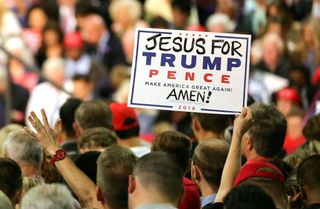
A woman holds a sign in support of Donald Trump during his rally at the Convention Center in Charlotte, North Carolina on October 14, 2016
One member of Silver's group, Amy*, lives in Ohio (another swing state). As a young Asian-American who grew up Catholic, voicing her support of Clinton is just not something she wants to risk. "When Hillary would show up on TV, my parents wouldn't hesitate to call her a 'liar,' a 'bitch,' and sometimes worse," Amy says. "Since I live near my parents, that makes it very difficult to openly support Hillary. It feels more like Trump supporters are the louder, more aggressive citizens, while the Hillary supporters would prefer to stay quiet rather than draw ire from the opposing side."
That may be changing. With the release of the Access Hollywood tapes in which Trump brags about sexually harassing women and the scores of women who have come forward in the weeks since to accuse him of sexual assault, the wall of silence is starting to break down.
There is a growing number of people questioning whether gay marriage and abortion should even be the primary issues for people of faith.
Recently, popular Evangelical author and speaker Beth Moore came out against Donald Trump. She tweeted: "I'm one among many women sexually abused, misused, stared down, heckled, talked naughty to. Like we liked it. We didn't. We're tired of it." In an article for the Daily Beast, Dr. Russell Moore, head of the Southern Baptist Convention's Ethics and Religious Liberty Commission, noted that he's seeing a groundswell of conservative Christian women who are privately opposed to Trump. "I have heard from many, many Evangelical women who are horrified by Christian leaders ignoring this as an issue," he said.
Katherine Francis, a political science professor at Western Governor's University, believes this dissatisfaction among women who traditionally vote Republican is indicative of a wider split between religious groups and the Republican Party. "There is deep unrest in the base, which since the 1970s has been associated with the Religious Right," explains Francis, who was raised in a conservative home. "There is a growing number of people questioning whether issues like gay marriage and abortion should even be the primary issues for people of faith."
Even in times of great Republican shift, the real impact of secret party-hoppers is impossible to measure. Bruce Nesmith, a professor of political science at Coe College in Cedar Rapids, Iowa, doesn't doubt that there are secret supporters for Clinton, but "all we have is survey data and we know that with survey data people tend to give the more socially acceptable answer," he observes.
It's the "spiral of silence" theory in action, which argues that because of our fear of isolation, an individual will be silent rather than voice what seems like an unpopular opinion. And breaking with Evangelical tradition to vote Democrat in this particular election is especially taboo, given Clinton's association with her husband, who drew fire from the Religious Right during the Monica Lewinsky scandal.
"If you're a Republican and an Evangelical voting for Trump, you probably know other people like you," observes Susan. "But if you're an Evangelical and Republican voting for Clinton...well, you are alone."
Maybe not forever. Maybe these women are just the start.
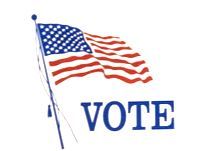
*Names have been changed.
Lyz Lenz is the author of Godland and Belabored. Her writing has appeared in The New York Times, Pacific Standard, and Buzzfeed. She lives in Iowa, but you can find her on Twitter @lyzl.
-
 Chrishell Stause Will Play the Villain If She Needs To
Chrishell Stause Will Play the Villain If She Needs ToThe 'Selling Sunset' star has achieved what few (maybe no one) in the reality TV genre has: being a longtime fan favorite. But with her appearance on season 3 of 'Traitors,' she's ready to make enemies and get a little scrappy.
By Brian Moylan Published
-
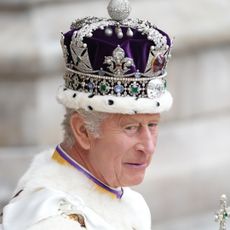 This Unexpected Royal is Richer Than The King
This Unexpected Royal is Richer Than The KingThe top three people on this list might surprise you.
By Kristin Contino Published
-
 Sydney Sweeney Winterizes a Plunging Mini Dress With a Sheer Turtleneck and a Fur-Lined Penny Lane Coat
Sydney Sweeney Winterizes a Plunging Mini Dress With a Sheer Turtleneck and a Fur-Lined Penny Lane CoatThe star layered all her favorite cold-weather trends for a night on Broadway.
By Hanna Lustig Published
-
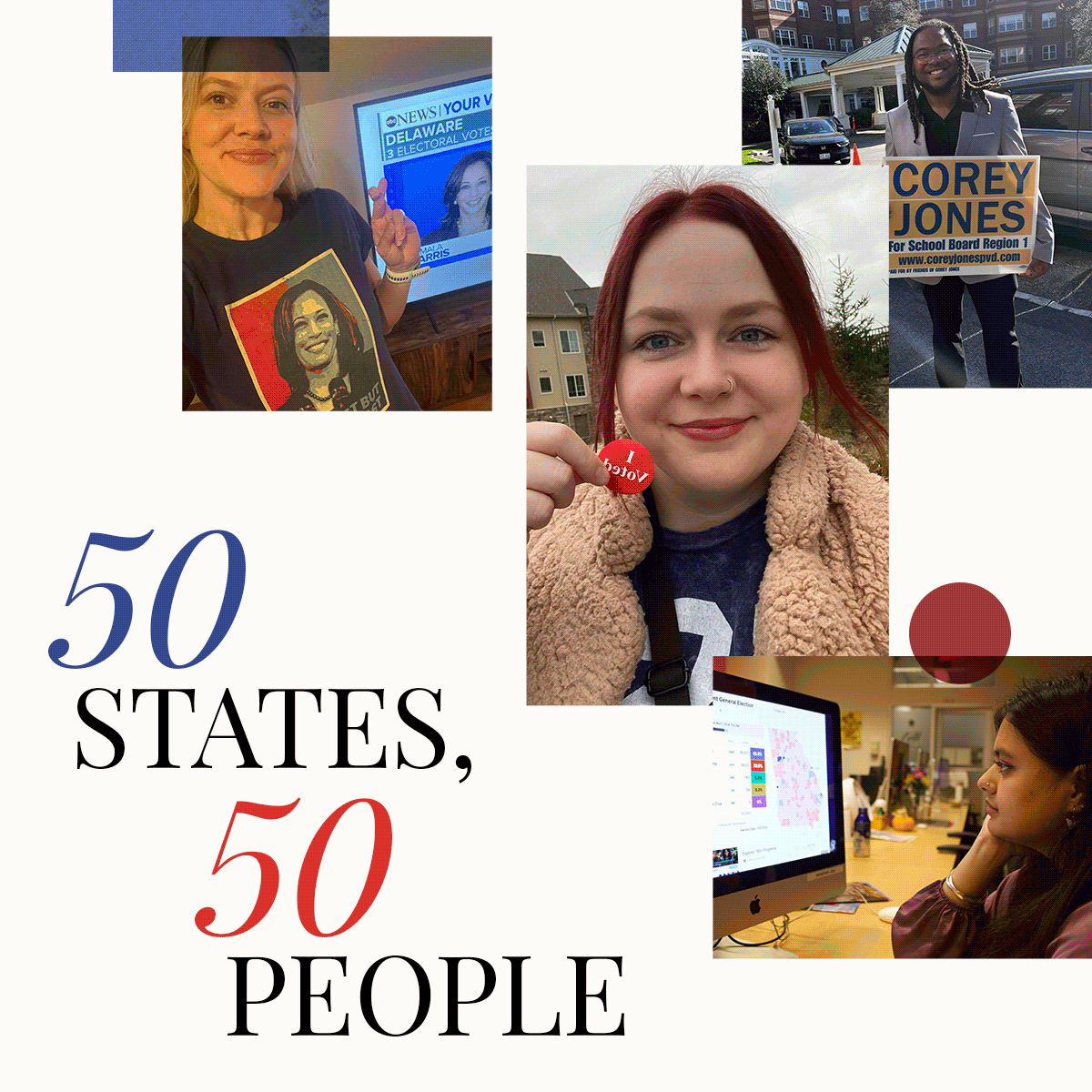 A Nationwide Reaction to the 2024 Election
A Nationwide Reaction to the 2024 ElectionHow are people feeling in this moment? Marie Claire spoke to folks across the country to find out what they were thinking as they cast their votes and waited to hear the results.
By The Editors Published
-
 The Historic Election Victories Worth Celebrating
The Historic Election Victories Worth CelebratingIncluding momentous firsts, abortion protections, and New York's "Equal Rights Amendment."
By Iris Goldsztajn Published
-
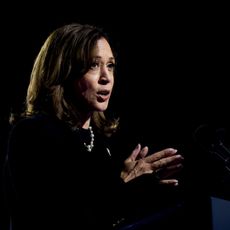 Kamala Harris Has Lost the 2024 Presidential Election
Kamala Harris Has Lost the 2024 Presidential ElectionIt's official.
By Jenny Hollander Published
-
 Donald Trump Is Ordered to Pay E. Jean Carroll $83.3 Million in Damages
Donald Trump Is Ordered to Pay E. Jean Carroll $83.3 Million in DamagesCarroll had filed two defamation suits against the former president.
By Gabrielle Ulubay Published
-
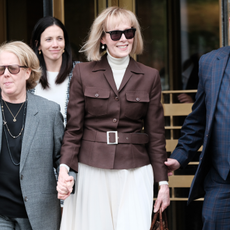 E. Jean Carroll Triumphs Over Donald Trump In Civil Suit
E. Jean Carroll Triumphs Over Donald Trump In Civil SuitA jury found him liable for sexual abuse and defamation.
By Gabrielle Ulubay Published
-
 36 Ways Women Still Aren't Equal to Men
36 Ways Women Still Aren't Equal to MenIt's just one of the many ways women still aren't equal to men.
By Brooke Knappenberger Last updated
-
 How New York's First Female Governor Plans to Fight for Women If Reelected
How New York's First Female Governor Plans to Fight for Women If ReelectedKathy Hochul twice came to power because men resigned amid sexual harassment scandals. Here, how she's leading differently.
By Emily Tisch Sussman Last updated
-
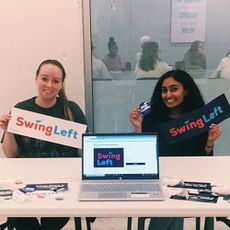 Why the 2022 Midterm Elections Are So Critical
Why the 2022 Midterm Elections Are So CriticalAs we blaze through a highly charged midterm election season, Swing Left Executive Director Yasmin Radjy highlights rising stars who are fighting for women’s rights.
By Tanya Benedicto Klich Published
